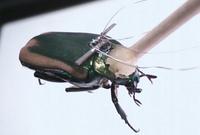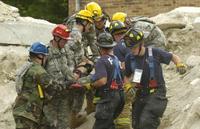-
Protecting first responders from a quiet killer

Emergency responders in Flagstaff, Gilbert, and Chandler, Arizona recently underwent a battery of medical tests to help minimize the risk of having a stroke or heart attack while in the line of duty; 44 percent of all firefighter deaths were the result of heart attacks, which is the leading killer of firefighters
-
-
Texting 911 in emergencies
The Post Falls police department in Idaho is testing a new 911 system that would allow residents to report emergencies via text message or e-mail
-
-
Georgia to build privately funded first responder training center
A local firm in Georgia is set to build a privately funded training facility for first responders that would bring more than 100 jobs to Perry; the sophisticated training center, built by Guardian Centers of Georgia, would help prepare first responders for natural disasters and terrorist attacks
-
-
Insects to become first responders, aid in search and rescue

Researchers are finding ways to harvest energy from insects, holding the promise of using insects to aid in first response and search and rescue, and monitor hazardous situations before sending in humans
-
-
Early 9/11 responders at greater risk of heart disease
A new study warns that 9/11 responders who arrived immediately after the attacks could be at greater risk of heart disease; researchers examined the blood vessel walls of thirty-one 9/11 responders and found that the nineteen men and women who went to work before 13 September had much greater damage to their blood vessel walls than those who arrived later
-
-
Pennsylvania’s homeland security office to operate out of state police HQ
The Pennsylvania Governor’s Office of Homeland Security will move its operations to the Pennsylvania State Police (PSP) headquarters in Harrisburg; the office was merged into the Pennsylvania Emergency Management Agency (PEMA) during the previous administration, but the governor determined that relocating the office to the state police headquarters would result in an even greater combination of intelligence gathering and sharing
-
-
Harvard-designed swarm robots licensed to Swiss company

Harvard researchers developed Kilobot — a low-cost, easy-to-use robotic system for advancing development of “swarms” of robots; robot swarms might one day tunnel through rubble to find survivors, monitor the environment and remove contaminants, and self-assemble to form support structures in collapsed buildings
-
-
Device allows summoning help where no cellular coverage is available
People who work or travel in remote places often find themselves in areas where there is no cellular coverage; summoning emergency help is thus difficult, if not impossible; a Colorado company offers a solution
-
-
New Jersey first responders to get universal IDs
Starting next year, 12,000 first responders in New Jersey will receive special IDs to help enhance security and cut down on identity fraud during emergencies and natural disasters
-
-
Tech breakthrough allows first responders to carry mini resuscitators
Thanks to PerSys Medical, first responders operating in rugged terrain are now able to carry a miniaturized version of a critical medical device that helps patients breathe
-
-
New Jersey first responders prohibited from taking crash scene photos
New Jersey lawmakers are currently considering a bill that would make it illegal for first responders to take pictures or videos of an accident and distribute them without the permission of the victim’s family; under the proposed law, any first responder who circulates an accident photo or video without permission could face as much as eighteen months in jail or a $10,000 fine
-
-
Operation Vigilant Guard tests Arizona disaster response

More than 250 agencies and 8,000 emergency personnel recently participated in “Operation Vigilant Guard,” one of the largest emergency response exercise in Arizona’s history; participants were forced to respond to two scenarios — a catastrophic flood and the detonation of a ten-kiloton Improvised Nuclear Device (IND) in the Phoenix metropolitan area
-
-
Training mission showcases Israeli counterterrorism techniques
A group of U.S. law enforcement officials recently concluded a weeklong training seminar on the methods Israel uses to prevent and respond to terrorism
-
-
First responders to get a break on car insurance
First responders in Maine could be getting a break on their insurance thanks to a bill making its way through the State House of Representatives; under the proposed bill, insurance companies would not be able to increase the personal insurance rates of emergency responders if they get into a car accident while performing their duties
-
-
Zombie herd tests Ohio’s emergency response capabilities

On Monday, a horde of ravenous flesh-seeking “zombies” descended upon Wesleyan University and tested the response capabilities of Ohio’s emergency personnel; in the spirit of Halloween, Delaware County recruited 225 volunteers to dress up as zombies and participate in a drill designed to help prepare first responders deal with real situations like hazardous material cleanups
-
More headlines
The long view
Using Drone Swarms to Fight Forest Fires
Forest fires are becoming increasingly catastrophic across the world, accelerated by climate change. Researchers are using multiple swarms of drones to tackle natural disasters like forest fires.
